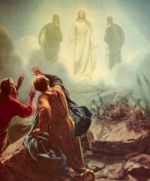Fathers of the Church
Epistle II: to Columbus, Bishop
by Gregory the Great in 590-604 | translated by James Barmby, D.d
Gregory to Columbus, Bishop of Numidia .
We received at the hands of the bearer, your deacon, the epistle of your Fraternity, in which you informed us of what had been done among you with regard to the person of the bishop Paul. This has been done so late that he could not now have appeared here in person. For his Excellency also, our son Gennadius the Patrician, sent his chancellor to us with reference to the same case. But when we had caused enquiry to be made whether he was willing to plead against him [i.e. against the bishop Paul] before us, he replied that he had been by no means sent with this intent but had only brought hither certain three persons from his Church who would allege many things against him. While, then, we neither found him prepared to commence an action, nor were moved by the quality of those persons to regard them as fit accusers of a bishop, we could not gainsay or offer hindrance to the often before-mentioned bishop Paul, who petitioned us in the hope of having leave given him to resort to the royal city; but we presently allowed him according to his petition, with two others whom he should take with him, to set forth. If, then, there have been any things that could be reasonably said against him, the proper course would have been for him to come here at once, and for your Fraternity to inform us of all particulars, as you have now done. For, as to your having signified to us that you suffer from the enmities of many on account of our frequently visiting you by our letters, there is no doubt, most reverend brother, that the good suffer from the grudges of the bad, and that those who are intent on divine works are harassed by the oppositions of the perverse. But, in proportion as these bad things are around you, ought you to be more instantly occupied with the care of the government committed to you, and to watch for the custody of the flock of Christ; and in proportion as the contrariety of unrighteous men presses upon you, ought the care of pastoral solicitude to inflame you to be more active, and very certain of the promised reward, to the end that you may be able to offer to the chief Shepherd gain from the work given you to do.
Taken from "The Early Church Fathers and Other Works" originally published by Wm. B. Eerdmans Pub. Co. in English in Edinburgh, Scotland, beginning in 1867. (LNPF II/XII, Schaff and Wace). The digital version is by The Electronic Bible Society, P.O. Box 701356, Dallas, TX 75370, 214-407-WORD.



